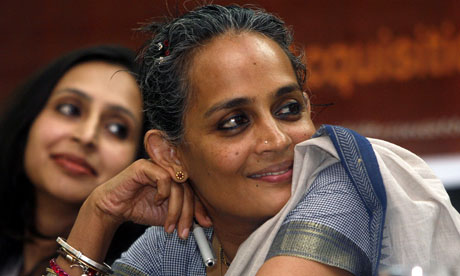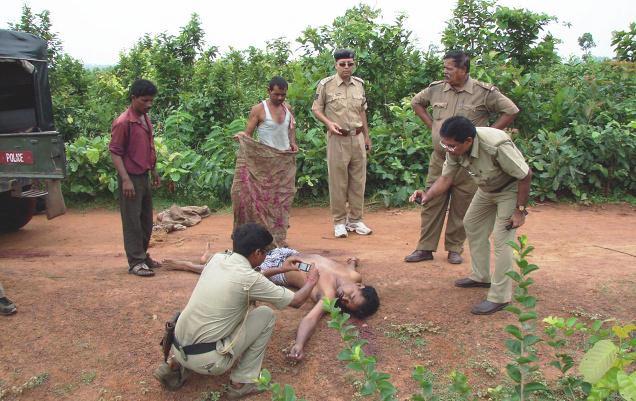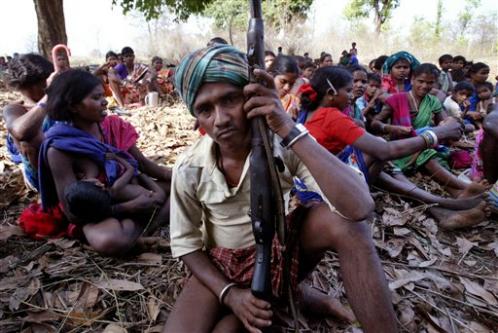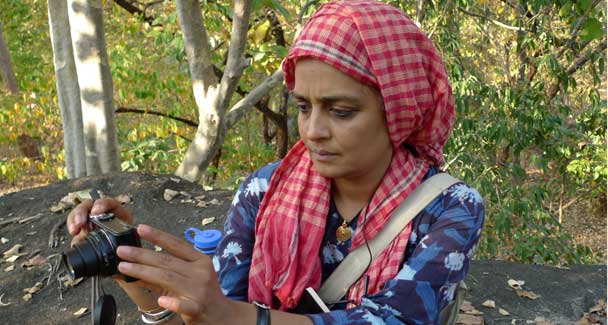
Arundhati Roy and the Beauty of the Naxalites
Being a beautiful woman is like living in a country that has oil. There is a kind of inevitable doom in it. So when I look at Arundhati Roy’s perfect jawbone, the symmetry of her nostrils, I can’t help thinking: be careful. Please be careful. Beauty creates a kind of invisibility — it blinds assuredly and dependably. The way a knife cuts, a records plays, a foot walks. Let each turn their reliable function into music.
Stone
There she is again on internet TV, projected across the world as an image, showing us the danger of a beauty we will never be able to see, because it turns viewers into stone. The broadcasters have prepared for this eventuality of course. The pre-screeners, the teleprompt scripters, the test audiences have advised them that Roy must never appear alone. The sponsors would like to put a warning text scroll across the screen advising viewers that they might turn to stone — or some other free thinking, non consuming material — if they stare too fixedly at her perfect face, but instead, armed with the latest rating numbers, they soften Arundhati Roy’s presence with monied avatars, after effected slogans and logos, executive offshore account apologists, all stand-ins for what used to be called The Man before media mergers stuffed the ruling class up into the pelvic floor and made us all long for domestic servants and retirement plans. Forget the inner child, this year I’m channeling my inner investment broker, betting against the subprime tide pools, the slippery slope of common cause and sense.
Becoming Beauty
When I see her on TV I notice that she doesn’t look at her media interrogator — friend or foe — no, instead she is looking directly at me. Do you think you can spend your whole life prepping for a single encounter, even a single look, so that you’ll be ready to receive it when it comes? When I find her like this, word wise and steady as she goes and determined in the way that a river bank is determined (no one ever mentions the violence of the banks, only the cost of entering the stream), I long to become one of her small, mostly unnecessary organs — her spleen for instance, or an extract of her liver. I want to learn the enzyme discharge, the protein uptake, the flows of cellular repair and expansion. I don’t want to look at beauty, instead, I want to become it, from the inside out.
Reading
I am trying to read her words — in other words, to relieve myself of the duty of her face, to stand up in the glare of that impossible face, and see what should never be seen. In the book her words are pulled away from her body and lined up in rows like soldiers, one after another. So measured and clear and compelling. She sure knows how to tell a story. Little surprise that she is a novelist, though it seems she is so busy speaking up against the uncommon sense of corporate India that she’s had little time for the follow up to The God of Small Things (1997), her Booker prize winning love story that grazes across castes and time zones. How to enter again the slip covers of fiction when the dispossessed forest dwellers of Dantewada are being hunted down by state militia?
Government Terror
She opens her report with a long trek into the jungle to meet the Naxalites, the dreaded Maoist rebels who have taken up with the many aboriginal tribes in India who are threatened by progress on every side. An old story it seems, dating back to the very earliest days of India’s independence, a war that never seems to end but returns under different names, in different parts of what only appears as a country. Vast hydro electric dams were built that swept away numberless villages at the end of a government rifle. Torture and rape and looting became routine weapons of a terrorist regime, striving to maintain their world bank commitments, their bylines in The Economist (“The Indian Miracle”), their capitalization requirements. Feed the ruling class, said the conventional wisdom, and the rest of the economy would look after itself. Today, once again, there are steel factories and bauxite mining concerns and forest inspectors who are trying to take what little the aboriginal people have. As a result, an invisible war is raging in India, largely unreported, or slathered over with layers of official versionings, and the so many cultures drawn inside the borders of this colonial adventure are being bloodied and erased one village at a time. It’s all worth it though, because it means that I can go down to the mall and buy T-shirts three for a dollar. A little genocide can go such a long way. And the tiny metal bits in my interactive home appliances, the ones that long ago replaced my best friends — well, all that metal was strip mined from towns whose names I can’t pronounce, and they produce a smile so large it covers the whole world like an insecurity blanket that warms even my forgotten appendages. The opposable thumb, the vestigial tail.
White Money
I paid the price, didn’t I? I walked up to the counter and said, “Give me that one,” and because I could lay down all that white money they gave it to me; they’ve been giving it to me for years, the thing that covers over the thing that I really want. If only you could touch me like my wingback Eames chair. If only you could talk to me the way my Genelec speakers sing to me, in their reliable dialect of reassurance. When I wake up in the morning my speakers say, “Yes. Yes please.” And I’ve grown to like that; need that feeling even. What can I say? They’re the best roommate I’ve ever had.
If there was a store that sold best friends, there would still be some people who would wait until boxing day so they could get buy them on sale, for cheap, at half the price. I don’t know if I’m one of those people or not, but one thing is for sure: I wouldn’t want my parents buying me a new best friend for Christmas. Because we all know the policy on the new paradigm, the new electro hula hoop, this week’s must-have, viral Facebook replacement therapy: there are no returns. You can’t give it back. You swing the hoop around those hips just once and some part of you is stuck doing it the rest of your life. You try to finish your downward dog only now you have hips that will never grow up. The technologies you embrace never end — only you do.
Constitution
“The Indian constitution, the moral underpinning of Indian democracy, was adopted by Parliament in 1950. It was a tragic day for tribal people. The Constitution ratified colonial policy and made the State custodian of tribal homelands. Overnight, it turned the entire tribal population into squatters on their own land. It denied them their traditional rights to forest produce. It criminalized a whole way of life in exchange for the right to vote, it snatched away their right to livelihood and dignity.”
I am reading these words with one hand in front of my face, because they are hurting me. The truth is, I don’t want to think about them, the tribal others, the forgotten ones who will never appear as extras in an international, best selling, glam music video. I live on aboriginal land by the way. A couple of years ago, one of the looming condo towers that are going up everywhere around me (oh didn’t I tell you? They are building an entire city with me at the centre of it) uncovered a Native burial ground. It was quickly excavated and the work continued. Westward ho and all that. I cycle along old Indian trails (like Yonge Street), making sure never to dwell on the home of the brave. Instead, I like to pick up articles like this one by Arundhati Roy, about far away struggles, so I can feel the righteous indignation rise up in my chest, and on a good morning I can muster up a tear or two. Oh yes, I feel so bad I feel good. And then I like to go down to the grocery store that sells things that European kings couldn’t buy with all the gold in their overflowing treasuries only a couple of centuries ago and just pretend that the half of the world that lives on less than a dollar a day aren’t my friends. I don’t visit their Myspace pages, I don’t keep up with their current art shows, their publishing projects, they’re not up in my face so I don’t think of them at all until I want a little shot of misery adrenalin.
The weight of so much suffering, the one-sided odds of having to wage war against one’s own government just in order to have a place to live that you already used to own seems too much. Or perhaps owning is the wrong word, perhaps home and homeland is something that you used to belong to, in the way that a favourite phrase belongs to you, a pet gesture, a tic. The truth is, I don’t know what home means for these homeless Indigenous people, perhaps every side of their encampment is a door always opening, and every wall is an invitation to enter.
Judy’s letter
Judy writes me from New Zealand, where she is at last far enough away from her own life to bring it into focus. “I didn’t call you over the holidays and for that I am sorry but there it is. I hope you are not entering into the pictures of the Palestinians too deeply. They have something we don’t have. Solidarity, a kind of love, and a powerful belief in the justice of their cause. It allows them to survive the terrible conditions in which they live. That strength is just as important to understand as the suffering, it seems to me. And for me at least, it is that strength that brings joy at the same time as sadness at their conditions because it is that kind of strength that gives hope for the kind of change we both want to see.”
Last sentence of Roy’s article
“Marching, not just for herself, but to keep hope alive for us all.”
Superintendent of Police says
“The problem with these tribals is that they don’t understand greed. Unless they become greedy, there’s no hope for us. I have told my boss, remove the force and instead put a TV in every home. Everything will be automatically sorted out.”
Roy writes
We will witness the day.
Why can’t he be one thousand people?
In this war, only the dead are safe enough to use their real names.
Almost everyone’s gun has a story.
They find me the best place, by the best grey rock.
Happiness is taken very seriously here.
It’s just a list. But it’s also a map of their world.
Every night I think of this journey.
Are they all going to die?
As soon as I read a sentence I send it to my personal memory shredder where it is ground up alongside the taste of yesterday’s lunch, the way you looked at me when we first met, the way your iliac crests soar whenever you say the word yes. Nothing remains, and not these words either. The truth is, I will never die. My heart will stop, the last breath will come, and then my body will forget, and just go right on. I’m not immortal or anything, I’m just modern, or postmodern, meaning that forgetting is the ground I stand on. What’s your name again?
Picture
Roy knows she doesn’t have to scream to be heard, her story is already a tall enough tale. But then I stumble into a photograph, we collide head on even though she says “young,” she uses the word “children,” she remarks over and again on the ages of the so-called maximum security threats. But when I see a picture, or rather, when one of the rare pictures suddenly appears asserting itself between the orderly lines of her army of letters, the perfect words stop flowing, and I am frozen for a moment looking at the children, these jungle kids with their post-kindergarten guns in their hands, held casually, the way you might hold a soda bottle at the beginning of a hot day – knowing that there’s a lot more where that came from. These baby gunslingers are stepping up for liberation and justice because there’s no one else to do it, I guess. I don’t know. I just don’t know. How badly I want their revolution to succeed, and how very much I would like them to put their guns down and go for a swim, or peel a mango in the slow shade, or learn how to kiss someone as if they were in love. Instead, their serious faces look back at me as if in accusation. And what did you do today? While we were out here in the jungle, fighting the fight of our mothers and fathers, and our grandfathers, taking on our government that only wants to give everything to the local Goldman and Sachs subsidiary and hunt us down while they’re at it. The shine on this child’s lower lip tells me, “We’ve got work to do.” I will never be as old as they are in this picture. And their eyes assure me that they will never be as young as I am right now – they have already seen too much, tasted too much death. Dying a little bit every day. What might savasana mean for these child soldiers?
Police
“I met the elected members of the Marskola Junatana Sarkar that administers six villages. They described a police raid; they come at night, 300, 400, sometimes 1,000 of them. They lay a cordon around a village and lie in wait. At dawn they catch the first people who go out to the fields and use them as human shields to enter the village, to show them where the booby-traps are. (‘Booby-traps’ has become a Gondi word. Everybody always smiles when they say it or hear it. The forest is full of booby-traps, real and fake. Even the PLGA needs to be guided past villages.) Once the police enter a village, they loot and steal and burn houses. They come with dogs. The dogs catch those who try and run. They chase chickens and pigs and the police kill them and take them away in sacks. SPOs come along with the police. They’re the ones that know where people hide their money and jewellry. They catch people and take them away… Villagers are too frightened to stay at home.”
Sound
When I turn the sound off so that I can hear her better, so that I concentrate on what she’s saying, her face returns to me. It seems she is always about to break out in a great groundswelling belly laugh. And the tribe of her hair is barely restrained in exactly the same way, it wants to come pouring out between us and rush forward in a thousand directions. She is speaking about the confluence of India’s Hindi nationalism and a centralized economic development model aligned with the United States that has necessitated a military state waging endless war against segments of its own population — who are predictably named as terrorists. She has a pen in her hand, as if she’s about to write down what someone else is saying, as if her talking is already a kind of listening. She has come to speak for those who would be shot on sight, who are not allowed on television. I am reminded again of the years of my childhood, watching the Vietnam War on television, a war they called in Vietnam “The American War,” and how I would never see someone from Vietnam unless they were bloodied and dead, or had their hands up in the air surrendering. One was never allowed to hear the voices from this faraway land, or think about young Vietnamese couples falling in love and out of it, or about Vietnamese fears of their Vietnamese parents getting sick, and what Vietnamese school am I going to send my Vietnamese kids too — or any of the ordinary extraordinary things that are going on every day. What if the only pictures of Canada showed dead Canadians, mutilated and burned from chemicals, blown up by landmines and hand grenades, screaming for our naked and bullet filled lives down Lakeshore Road? Or holding our hands up for surrender? Though perhaps there are other pictures that also register surrender: every time I reach for my television set soother, my distracting machines of escape and release, the words I use that ensure a proper and necessary distance between your life and mine. The next step, the next inhale, the next time I roll up my yoga mat to go to the studio: are these also ways of saying: I surrender?


